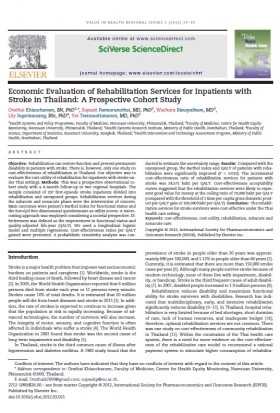This website uses cookies so that we can provide you with the best user experience possible. Cookie information is stored in your browser and performs functions such as recognising you when you return to our website and helping our team to understand which sections of the website you find most interesting and useful.
Economic Evaluation of Rehabilitation Services for Inpatients with Stroke in Thailand: A Prospective Cohort Study (2012)

รายละเอียดเพิ่มเติม
Economic Evaluation of Rehabilitation Services for Inpatients with Stroke in Thailand: A Prospective Cohort Study.
- Orathai Khiaocharoen, BN, PhD1, , , ,
- Supasit Pannarunothai, MD, PhD2,
- Wachara Riewpaiboon,MD3,
- Lily Ingsrisawang, BSc, PhD4,
- Yot Teerawattananon, MD, PhD5
- 1 Health Systems and Policy Programme, Faculty of Medicine, Naresuan University, Phitsanulok, Thailand
- 2 Faculty of Medicine, Centre for Health Equity Monitoring, Naresuan University, Phitsanulok, Thailand
- 3 Health Systems Research Institute, Ministry of Public Health, Nonthaburi, Thailand
- 4 Faculty of Science, Department of Statistics, Kasetsart University, Bangkok, Thailand
- 5 Health Intervention and Technology Assessment Program, Ministry of Public Health, Nonthaburi, Thailand
Abstract
Objective
Rehabilitation can restore function and prevent permanent disability in patients with stroke. There is, however, only one study on cost-effectiveness of rehabilitation in Thailand. Our objective was to evaluate the cost-utility of rehabilitation for inpatients with stroke under Thai settings.
Methods
This was a prospective observational cohort study with a 4-month follow-up in two regional hospitals. The sample consisted of 207 first-episode stroke inpatients divided into rehabilitation and unexposed groups. Rehabilitation services during the subacute and nonacute phase were the intervention of concern. Main outcomes were patient’s Barthel index for functional status and the EuroQol five-dimensional questionnaire as utility scores. A microcosting approach was employed considering a societal perspective. Effectiveness was defined as the improvement in functional status and quality-adjusted life-year (QALY). We used a longitudinal logistic model and multiple regressions. Cost-effectiveness ratios per QALY gained were presented. A probabilistic sensitivity analysis was conducted to estimate the uncertainty range.
Results
Compared with the unexposed group, the Barthel index and QALY of patients with rehabilitation were significantly improved (P < 0.010). The incremental cost-effectiveness ratio of rehabilitation services for patients with stroke was 24,571 baht per QALY. Cost-effectiveness acceptability curves suggested that the rehabilitation services were likely to represent good value for money at the ceiling ratio of 70,000 baht per QALY (compared with the threshold of 1 time per-capita gross domestic product per QALY gain or 100,000 baht per QALY).
Conclusion
The rehabilitation services for stroke survivors were cost-effective under the Thai health care setting.
Full Text: http://www.sciencedirect.com/science/article/pii/S2212109912000222




